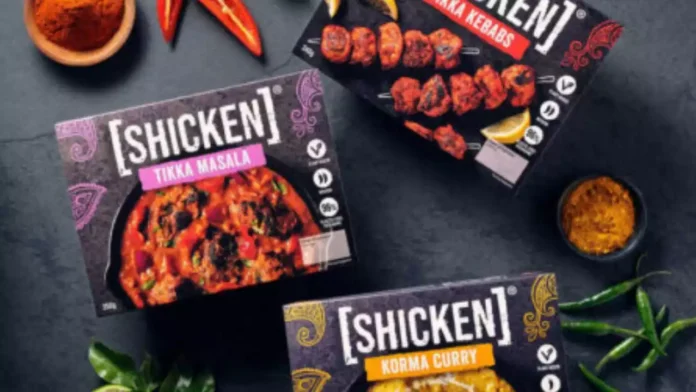Shicken, a UK-based producer of vegan ready-meals, is targeting profitability by 2025 after its recent expansion into the US market earlier this year.
According to Shicken’s co-founder Parm Bains, the company projects a fivefold revenue increase, setting a revenue target of £5.6 million ($7 million) following its recent listing in the US.
The US has become Sprouts Farmers Market’s sixth overseas area with the launch of the plant-based ready-meals in 410 stores nationwide.
“What we’ve seen is actually greater opportunity from a global perspective because the domestic market has become oversaturated,” stated Bains, who created Shicken with his wife Satvinder. There are many competitors in the plant-based market, regardless of whether products are chilled or frozen.
Continue Exploring: Kraft Heinz and NotCo team up to introduce innovative plant-based hot dog alternative
“One of our main advantages is that we can produce 20,000 metric tonnes of volume at our current manufacturing facility in Dartford, Kent. Only 15% of the factory’s capacity is being utilised. Thus, there is room for us to keep expanding in the plant-based industry, both locally and globally.”
The co-founder stated that 70% of the business will be directed towards international markets, with the remaining 30% focused on the domestic market.
In its second round of funding, the business secured £4 million ($5 million) from vegan investment fund Veg Capital, bringing the total invested capital since Shicken’s establishment in 2020 to £6 million.
According to Bains, the main goal of this new money is to keep investing in our facility, in our personnel, and in helping them develop. That will enable Satvinder and me to carry on with our global expansion.
“Our ultimate goal is to leave this business to our children, so we intend to stick with the longer-term plan of continuing to have an effect on animals in the supply chain as well as to produce durable, ethical products.”
He further mentioned that Veg Capital, established by Veganuary campaign co-founder Matthew Glover, now holds a “significant stake” in Shicken, although specific details were not disclosed.
Shicken offers a variety of plant-based options, including Indian-style curries and vegan kebabs, alongside their plant-based chicken alternative, crafted from a blend of soya, wheat, and pea protein.
Continue Exploring: Nestlé India collaborates with SOCIAL and BOSS Burger to debut MAGGI’s plant-based menu across major cities
Bains mentioned that the Dartford-based company is also receptive to own-brand and private-label manufacturing, and is currently “exploring various opportunities for late 2024 and even into 2025.”
The company has already established a presence in foodservice channels, partnering with US-based Sysco and discount retailer Costco in various European markets, such as the UK, Iceland, Sweden, France, and Spain.
Regarding the current state of the plant-based sector, Bains remarked, “The market was inundated with numerous plant-based products, but what we’ve witnessed in the last 18-24 months is its maturation. There’s been a shift towards higher quality offerings in the category, with lower quality products fading out. For us as a business, focusing on quality is paramount moving forward.”
According to him, the current climate has caused consumers’ behaviour to alter, and as a result, they have less money to spend. This is in addition to the category maturing and going through a phase of extremely quick growth. The use of that money has been really judicious on their part.
“I believe the problem for the manufacturers and brands in the plant-based community is that everyone is vying for the same place at the moment. In addition, we want to make sure that we are presenting our items to customers and conversing with them.”
Continue Exploring: Costa Coffee and BOSH! team up to introduce delectable plant-based delights across the UK





